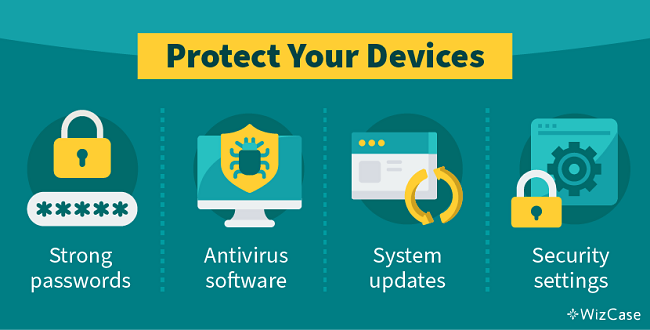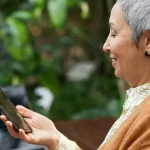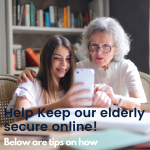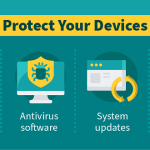The world of digital media is full of surprises, but also challenges. Although the impression often arises that the Internet only offers opportunities for young people, older generations can also benefit from the possibilities of the Internet and digital media. So that you can take full advantage of the advantages of the digital world, in this article we will give you some tips on how to stay safe on the Internet.
Tips for safe surfing and more security on the Internet
In order to fully enjoy the good things about the Internet, you should follow a few basic safety instructions :
- Purchase and install security programs.
Antivirus programs allow you to surf online safely. Known threats such as viruses or Trojans are detected and rendered harmless by these programs.
- Install updates regularly.
Updates close security gaps. Whenever your computer or a program you use wants to update, you should agree to it.
- Surf encrypted websites.
You can recognize an encrypted website because the Internet address begins with “https”. If there is only “http” in the line, hackers can intercept your data more easily. You should pay attention to this, especially if you want to shop online .
- Do not use public networks.
You can often use the internet for free in the shopping center or café. However, these networks are most often not encrypted, allowing fraudsters to steal your data.
- Stay anonymous.
Always only disclose the data that is absolutely necessary online. If a site does not seem trustworthy to you, you should not provide any information about yourself.
- Do not download anything from unknown sources.
Viruses and Trojans can hide in downloaded files. Therefore, download files only from trusted sources. If you are unsure, you can also have your antivirus program check the file before opening it.
- Protect your home network.
It is best to have your WiFi router set up by a professional. An associated password is usually sent with the router. You should replace this with your own password. This will ensure that no strangers gain access to your home network.
Just To Know: Save your favorite pages and important addresses such as those for online banking in your bookmarks. This means you can always find the right page again. In most browsers you can recognize the bookmark function by a small star symbol at the end of the address line.
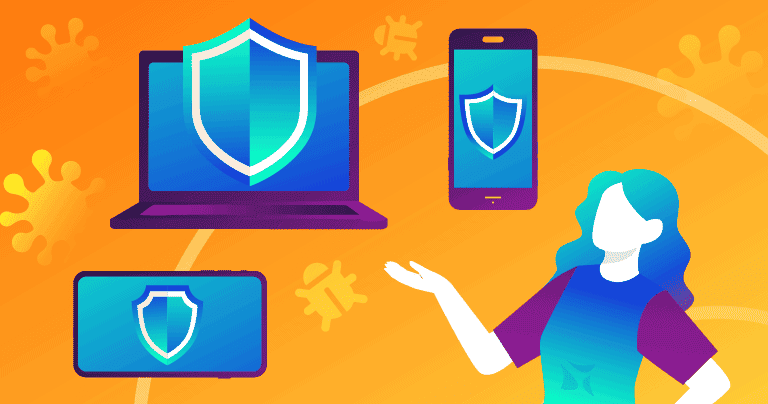
Password Security: How to create a strong password
To protect your data and user accounts on the Internet, they are secured with passwords. Therefore, the password you set should be as secure as possible. This means only you have access to your personal information. Below we have summarized some tips for more password security :
- A password should be at least 10 characters long. When you create a strong password, it should contain a mix of uppercase and lowercase letters, numbers, and special characters such as !?/%.
- Don’t use the same password over and over again. Come up with a new password for each user account.
- Do not share your passwords. Even if you are asked to do so in emails or calls, you should never comply with such requests.
- Do not save your passwords in the internet browser. More secure are password manager programs that can manage your passwords for you.
Just To Know: You can remember your password better by making a sentence out of the individual parts. For example: Your password is: OA!10zFsD). A mnemonic could be: Grandpa Armin! 10 tame foxes are standing there).
Email security: What you can keep in mind
Not only does your email account allow you to send and receive electronic mail, it is also crucial when it comes to the security of your user accounts . Whoever has access to your email account can theoretically change the passwords of all other user accounts. You should therefore be particularly careful here:
- Use a very strong password for your email account . You should also set up 2-factor authentication for your user accounts. Using this method, for example: For example, a code will be sent to your smartphone, which you will then need to register. Only those who have access to your password and your smartphone can log into your account.
- If you receive an unexpected email, you should first check who the message came from. Please also take a close look at the email address . Check the salutation and look for errors in the text. All of this can tell you whether the email may be from a scammer.
- If you receive an email from an untrustworthy sender , you should not click on links in the text or download attachments. You can often recognize senders of dangerous spam emails by cryptic email addresses that consist of combinations of numbers and letters , or by a dubious, incorrect cover letter.
- If you receive a suspicious email with an attachment, you should not click on or download it. Attachments may contain malicious programs . Therefore, only open attachments from senders you trust.
- Don’t let email pressure you into changing your password, disclosing sensitive information, or closing deals. Reputable providers would not request such information from you via email.
Just To Know: Do not post information about when you are going on vacation on social networks. This information can fall into the wrong hands and encourage burglars to take advantage of your absence.
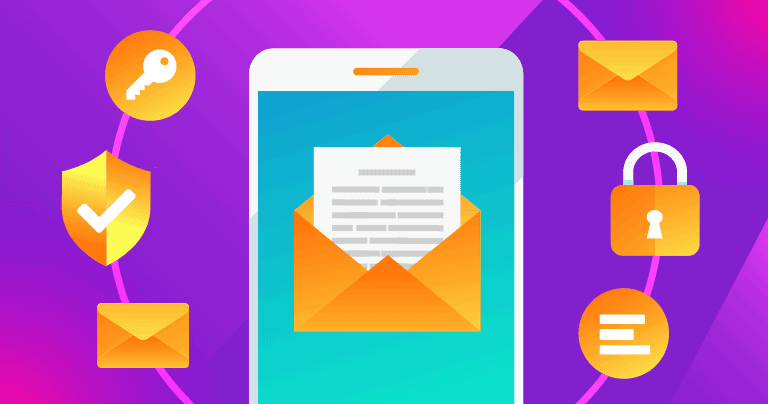
More security in social networks
Social networks can also enrich the lives of many seniors. So that you can surf safely and communicate with friends here, you should pay attention to these security aspects:
- Pay attention to data.
Social networks are there to present yourself. Nevertheless, you should be careful with your data and think carefully about what information you want to reveal about yourself.
- Detecting fake profiles.
Only accept friend requests from people you know. However, sometimes fraudsters create a fake profile of a person to steal your information. Therefore, always look at the profile carefully and look for any inconsistencies.
- Change privacy settings.
Set your social network accounts so that only friends and followers (i.e. subscribers) can see your published content and send you messages.
- Think about your own contributions.
Posts, comments, published photos, and group affiliations say a lot about you. Therefore, always think twice before becoming active on social networks. You should also be careful not to violate any personal or copyright rights, especially with photos.
- Check messages and posts carefully.
Stay particularly vigilant on social networks and do not trust every message or post. Many users also publish fake news here – so-called “fake news”.
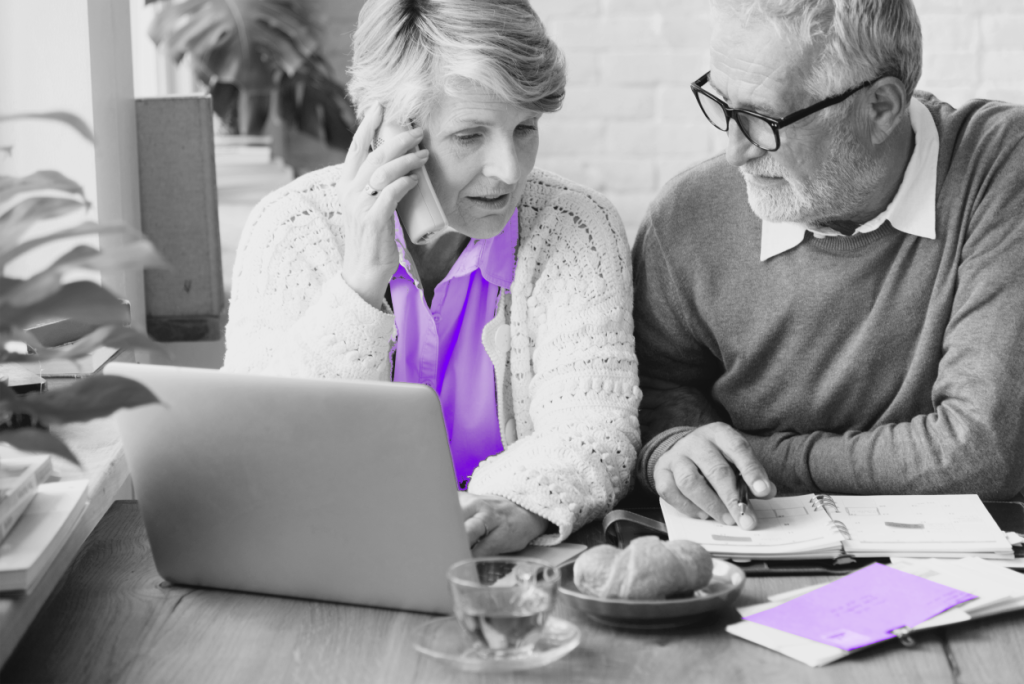
Shop safely online: online shopping for seniors
You can use the Internet to quickly and easily run errands, restock your wardrobe or find a good deal on a trip from home. To ensure that supposed bargains do not later turn out to be cost traps or fraud, you can pay attention to a few basic security aspects when shopping online .
Online banking for seniors
With the help of online banking, you can carry out your banking transactions from the comfort of your sofa. This saves you the long journey to the bank branch and possible waiting times in front of the ATM.
Stay in touch online: video calls etc.
Even if family and friends live further away, you can stay in touch with each other via video calls, messenger apps, etc. There are many options on the Internet for making easy phone calls, writing messages and always sharing the latest experiences with your loved ones.

Setting up your smartphone for seniors
Operating a smartphone often seems complicated at first glance. However, with just a few clicks you can change the settings of a smartphone so that it is easy to use even for seniors . With the help of operating aids and special apps, you can then further increase the senior-friendliness of the device.
Living in old age: technical aids for seniors
Digital media and smart technology can make our lives easier in many areas. Seniors in particular who would like to live independently at home for as long as possible can benefit greatly from the latest technical advances.
Employment opportunities online
The digital world also has a lot to offer seniors. However, many people are not even aware of the diverse employment opportunities and offers online . On the Internet, seniors can not only expand their horizons of knowledge, but also discover new hobbies, exchange ideas with like-minded people or create interesting content themselves and upload it to the Internet.
